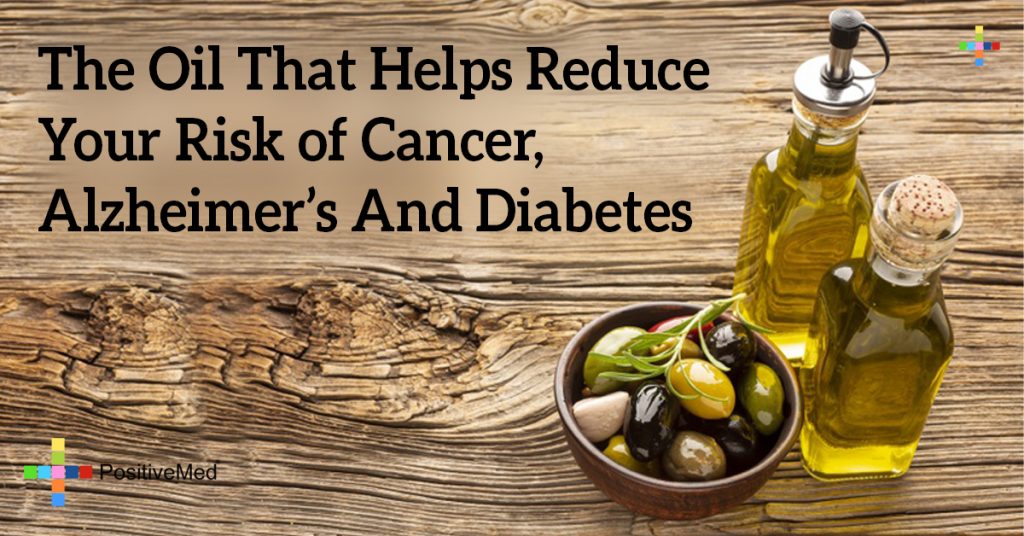
The Oil That Helps Reduce Your Risk of Cancer, Alzheimer’s And Diabetes
[nextpage title=”…”]
For centuries, Mediterranean peoples held the venerable olive in high esteem. Even though several countries claim to be the olive’s birth place, scientists agree that the olive tree has Middle Eastern origins. Early people cultivated this member of the Oleacea family and its popularity spread throughout the Mediterranean area and beyond.

Olives and their essential oil were part of the religious rituals of many ancient societies, such as the Greeks and Romans. Olives were prominent in these cultures and were referenced in their art and culture. People loved the taste of olives and used the oil for cooking and for lighting lamps. Early physicians touted olive oil as the perfect elixir for good health and beauty. These little green beauties had great value in the ancient trading market.
We can thank the Romans for introducing olive trees to the countries of their expanding empire. Some of the first European explorers brought olives to the New World and planted groves in the rich California sunshine. They continue to be an international favorite.
According to the International Olive Council, people from around the world consumed over 3.3 million tons of olive oil in 2010. These figures have increased over the past few years. There are a plethora of studies which assert the benefits of olive oil for our health. Several diseases and disorders have shown positive correlations with olive oil consumption. Although these studies did not give an exact daily dosage, most experts agree that at least two tablespoons of extra virgin olive oil a day is beneficial to people.
[/nextpage] [nextpage title=”…”]
How To Use Olive Oil
There are different grades of olive oil and extraction processes. Some people enjoy taking little sips of the oil as it is. Premier olive oil tastings are almost as popular as wine tastings in parts of the Middle East and Europe. If taken straight-up, health experts claim people should use cold-pressed, extra-virgin olive oil. It comes from the first pressing of the olives and does not use damaging heat for extraction. All of the vitamins and phytochemicals stay intact. Most nutritionists advise a healthy dose of 2-4 tablespoons throughout the day. Extra virgin olive oil is also a delicious dip for bread or fresh vegetables and is one of the main ingredients of classic vinaigrettes.
Less expensive grades of olive oil can be used for frying and baking. Olive oil is 100% fat and can be exchanged in recipes unit for unit. Olive oil imparts a sweet, delicate taste to baked goods and sauces. Even when using the regular grade, people will still reap health benefits.
Olive oil is rich in Vitamin E and is an ideal emollient for dry skin. It has been a beauty oil since the days of the Pharaohs. People can rub it in from head to toe after a shower to lock in moisture. Olive oil keeps the skin nourished and radiant. It can also be used as a carrier oil or on its own as a relaxing massage oil.
It is important to remember that just because olive oil has many health benefits, it is not a limitless food. Although it is a heart-healthy fat, it is still fat and should be used in moderation. Again, most people see its benefits when they keep their intake from 2 to 4 tablespoons in their daily diets.
Olive Oil and Alzheimer’s Disease
A study done by Italian scientists that was published in the PLOS One Journal used two groups of mice to study the effects of olive oil’s main polyphenol. The first group of mice received the polyphenol and the second one did not. After two months, the scientists tested both groups and found that the group that got the olive oil extraction had better memory skills. They completed skill tests better than the other mice. This study backs up previous work that shows correlations between consuming extra virgin olive oil and Alzheimer’s prevention.
[/nextpage] [nextpage title=”…”]
Olive Oil and Diabetes
Health experts say that humans need a certain percentage of fat in their diet to stay healthy; however, some fats are better than others. Fats that derive from meat are saturated fats and should be consumed in small amounts. Olive oil is among the beneficial unsaturated fats. A study published by the American Diabetes Association in the Diabetes Journal suggests that olive oil can help lower people’s levels of triglycerides. These levels are often problematic in diabetics. The same study says that certain components of olive oil can positively affect insulin levels and may reduce deposits of belly fat, a leading cause of Type II diabetes.
RELATED ARTICLE: This Vitamin Deficiency Increases The Risk of Alzheimer’s or Dementia
Olive Oil and Cancer
A landmark study was published in the medical journal Molecular & Cellular Oncology that suggests that olive oil may be useful in destroying cancer cells. According to the study, olive oil contains a natural substance called oleocanthal. When this extraction was applied to live cancer cells, the scientists discovered that these cells self-destructed. While it is a promising breakthrough, more studies need to be completed. The authors of the study also pointed out that it is unknown how cancer cells are affected when humans consume olive oil. Studies among people of various Mediterranean countries show fewer instances of certain cancers. Experts already know that a proper diet can lower cancer risks. Consuming healthy amounts of olive oil can enhance these benefits.
Olive Oil and High Blood Pressure
The Archives of Medical Reports has a study where a controlled group of people incorporated four tablespoons of olive oil into their diets every day. They also ate healthy portions of fruits, vegetables, and fiber. As their blood pressure lowered, the doctors would lower the dosage of their blood pressure medication. At the end of the year-long study, the participants maintained a lower blood pressure and their medication was cut nearly in half. Of course, people should not adjust any medications without guidance from their doctor.
[/nextpage] [nextpage title=”…”]
Olive Oil and Osteoporosis
Olive oil is a best friend for the bones. It provides lubrication for the joints and helps the body absorb Vitamin D, an essential bone builder. As people get older (particularly women), they lose bone density and the bones become brittle. Because of this condition, the bones break down and we often see elderly people with stooped backs and severe arthritis.
A study involving rats was done to observe the effects of olive oil on bone density. The rats had their ovaries removed and were chemically similar to humans after menopause. One group received doses of extra virgin olive oil and the other ones did not get any. The scientists were amazed to find that bone density increased in the rats who were taking the olive oil. The rats that did not have the supplement had lower calcium levels and other bone-friendly nutrients.
This is one of the many studies that some doctors use to encourage their patients to have at least two tablespoons of extra virgin olive oil daily for bone health. The ancients knew what was good for them. Studies are still being conducted to discover more about this amazing oil.
[/nextpage]





